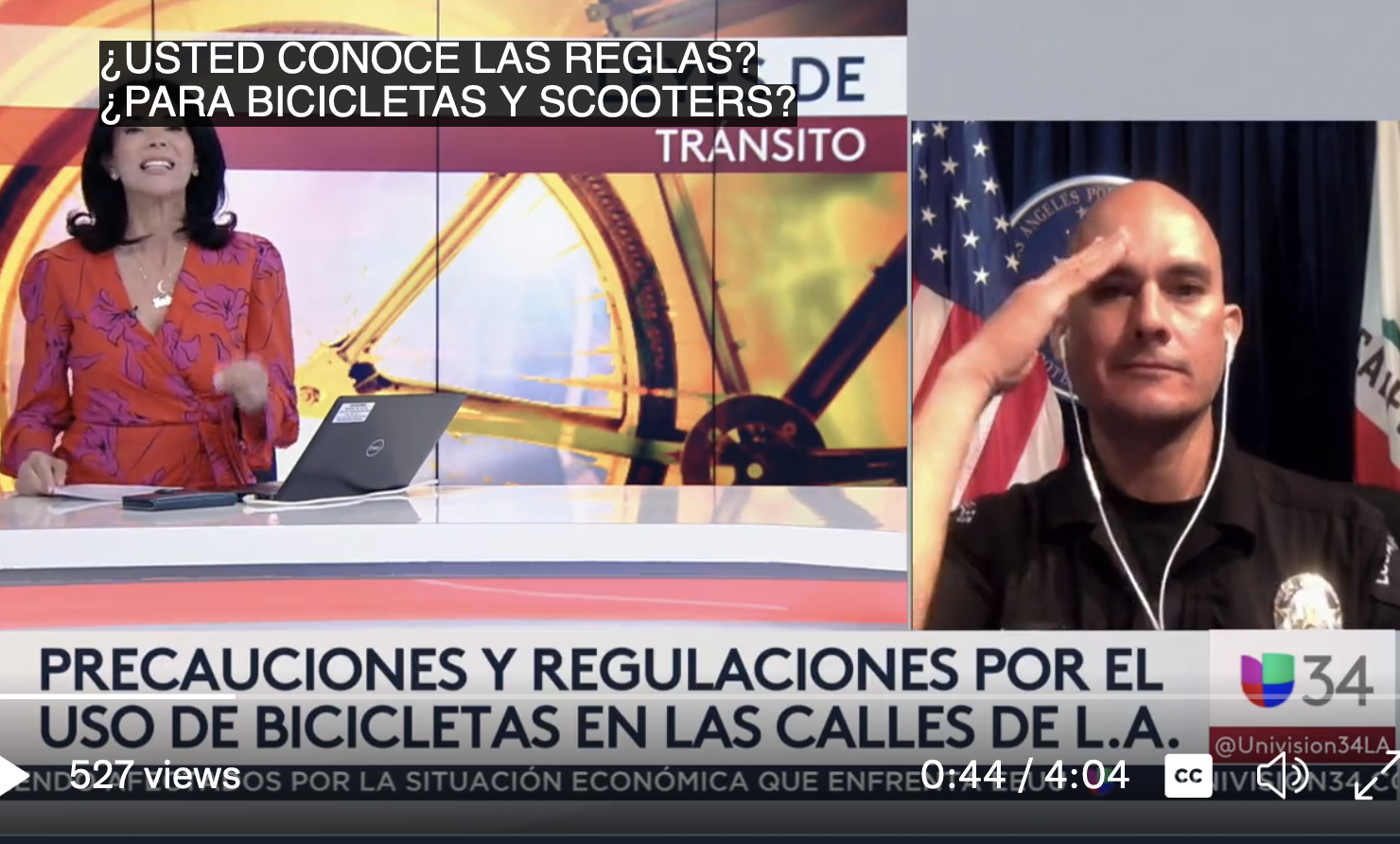Seven years after the launch of Vision Zero, it turns out that the Los Angeles Police Department - one of the lead implementing agencies tasked with reducing traffic fatalities to zero by 2025 - still doesn't have a handle on basic traffic laws or much insight into the specific challenges that cyclists on the margins face.
That will not come as a surprise to cyclists and transportation advocates who have long complained that the department is quick to assign blame to cyclists for collisions, ticket them for non-existent infractions, or use an infraction as a pretext for a stop and search of Black and brown folks on bikes.
But it's another thing entirely to see the department actively spread misinformation to Spanish speakers via a news segment dedicated to educating viewers about the rules of the road, as LAPD spokesperson Jáder Chávez (above) did this past June 24.
To be somewhat fair, the Univisión segment in question was likely doomed from the start: rather than it being in service of protecting cyclists/scooterists from reckless drivers and the alarming rise in hit-and-runs, anchor Gabriela Teissier framed the segment as being about how to protect drivers and pedestrians from people on bikes and scooters.
But at no time did Chávez make the effort to steer her in a more productive direction. Or even a factually correct one.
So when she began by asking if people on bikes or scooters were allowed to ride on the sidewalks, he immediately told her that they were not.
"[They] cannot ride on the sidewalk," he said [in Spanish]. "What we recommend instead is that, if you are going to ride in the street, you have to ride in what is called a 'bike lane' - a lane designed for bicycles. And if you are going to ride in those lanes, you must ride at speeds lower than 15 miles per hour."
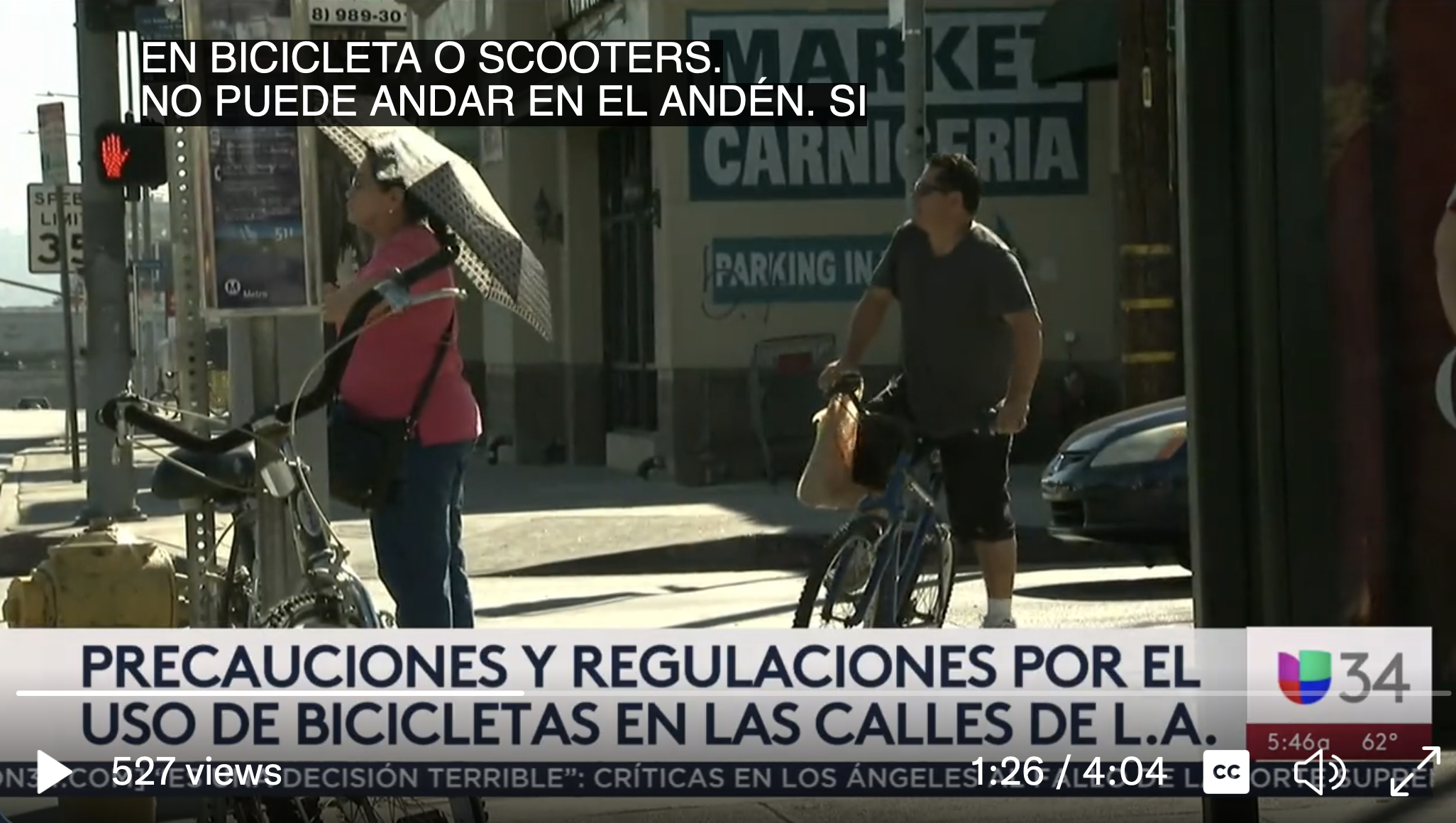
He is, of course, wrong.
The sidewalk prohibition applies only to electric scooters - not bikes (or even low-speed electric bikes).
Laws targeting electric scooters were born out of the contentious debates about sidewalk clutter, user safety, and potential harm to pedestrians when said scooters began materializing en masse on California sidewalks several years back.
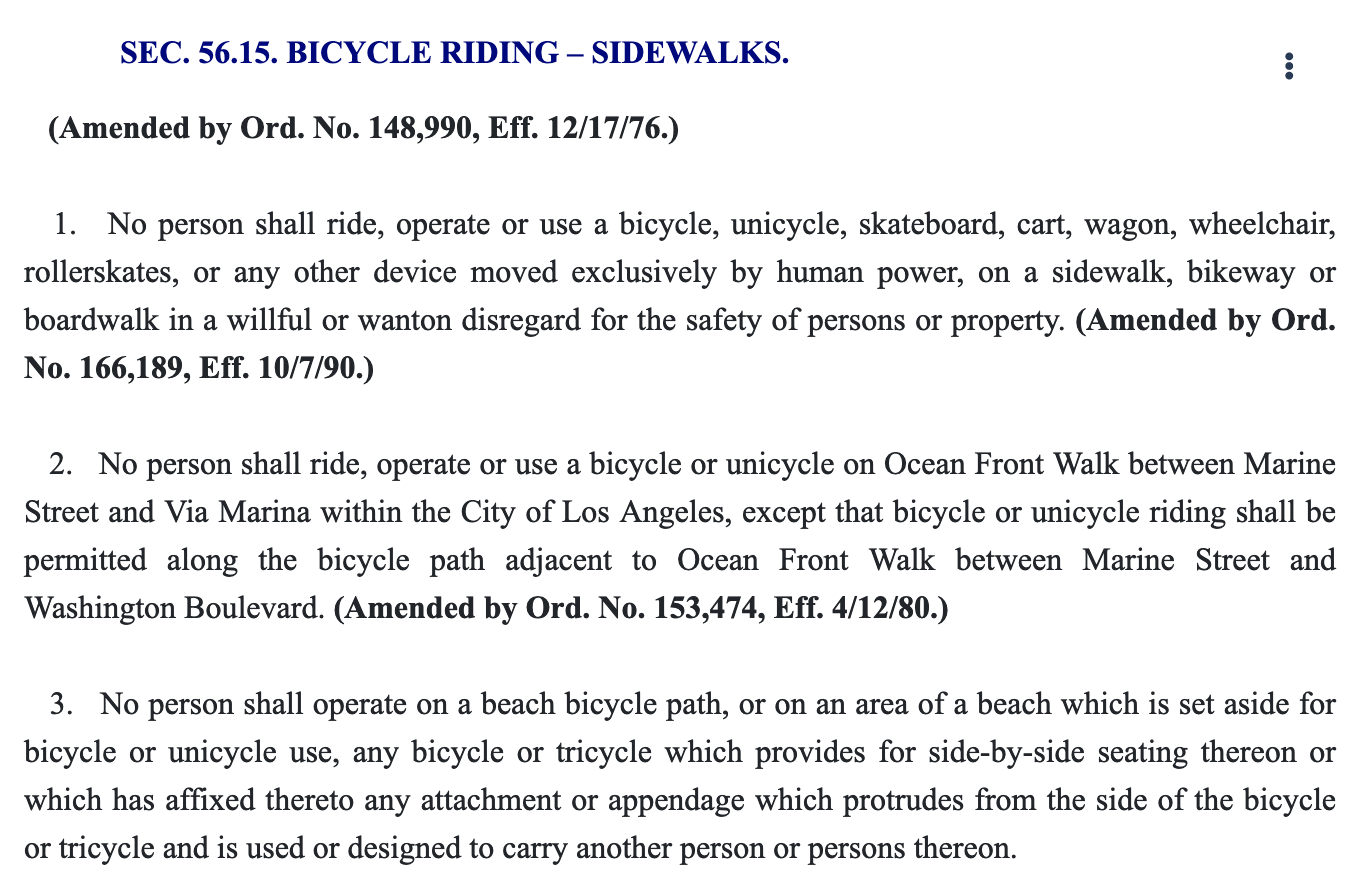
In contrast, per L.A. City Municipal Code, cyclists continue to be free to ride on the sidewalk (except in areas where it is explicitly prohibited), as long as they do so in a way that is mindful of pedestrians and property (below).
Similarly, the 15mph speed limit applies to motorized scooters, not cyclists in bike lanes.
But Chávez wasn't done.
When asked what cyclists and those on scooters should do in cases where there were no bike lanes, Chávez said they should stay alert and use side streets whenever possible.
Rather than acknowledging that L.A. lacks a viable bike lane network or discussing how, where, and when cyclists can/should take the travel lane according to CVC 21202, he advised cyclists to "watch for cars, doors that open, children...everything that you should watch for [while] in a car."
And when at intersections, he said, they should make sure drivers see them because signals alone can't be trusted.
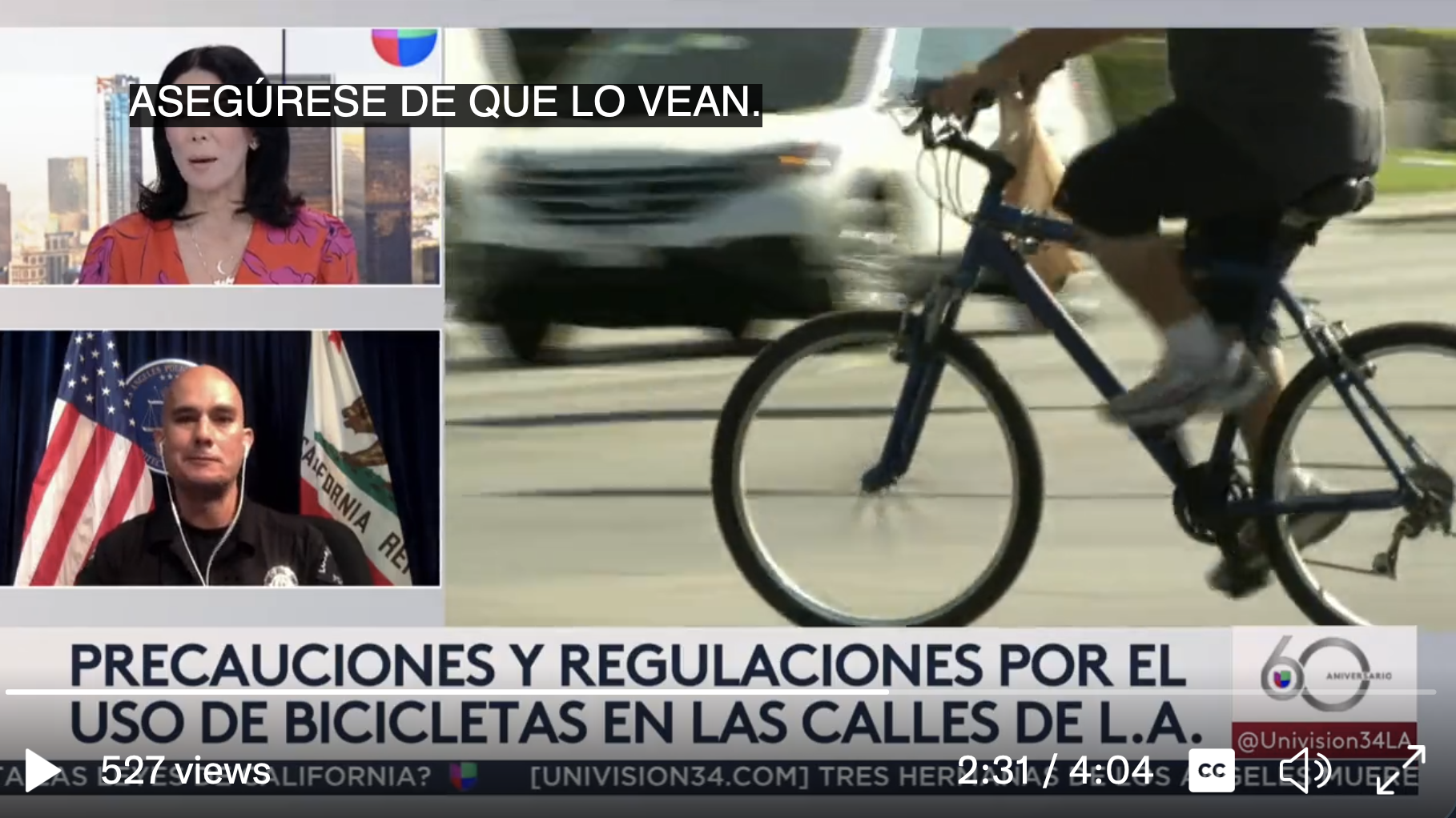
Teissier did not probe for more information.
Instead, she moved on to conflicts between bicycles and cars and asked about when cyclists might be ticketed.
Chávez again returned to sidewalk riding.
"People who ride on the sidewalk would be ticketed," he declared.
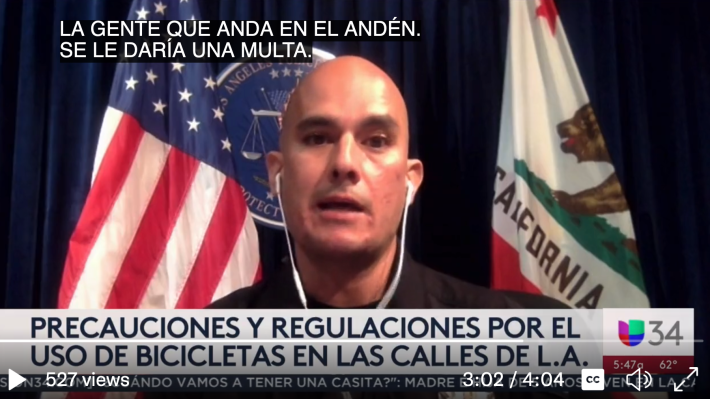
He then claimed there were exceptions, such as when traffic is really heavy and the sidewalk is also clear, as long as the cyclists rode very slowly.
"Listen, we're not here to extract money from people and give them fines/citations," he interjected suddenly. They do it to enforce the laws. "When people make a decision to risk their lives or the lives of others - that's when we have to ticket them."
He was, of course, completely wrong about all of it.
Moreover, ticketing people for engaging in a legal activity is the definition of extractive behavior - costing them time and money they shouldn't owe and likely don't have.
But Teissier had already nodded, said "Muy bien," and moved on to helmets.
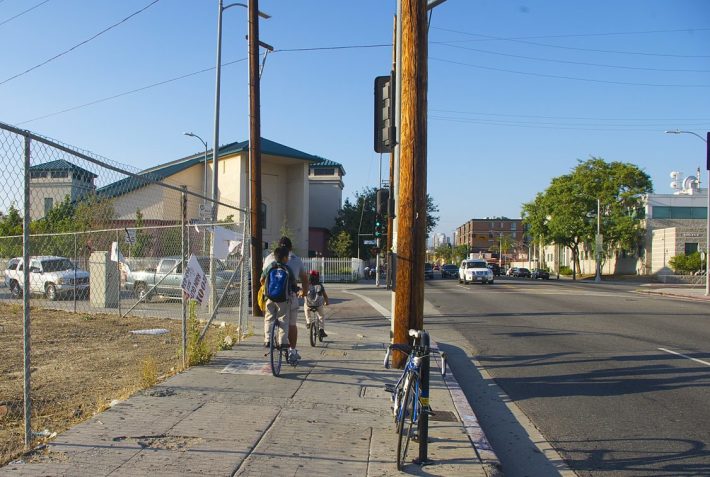
The problem with LAPD spreading misinformation this way is that many of those riding out of necessity in L.A. are monolingual Spanish speakers who already feel apprehensive about riding and who don't always feel that they can turn to LAPD when they need assistance. Making them more fearful that they could run afoul of the authorities by being on the sidewalk could push some into the roadway, regardless of how prepared they and their kids are to hold their own against fast-moving traffic on busy thoroughfares.
As it is, many may already be worried they could be ticketed or lose their bikes should they stop to get a part or help with a repair from someone on the street, thanks to a new ordinance targeting streetside bike assembly, sales, and repairs.
People ride on the sidewalks because experience has taught them that the streets are unsafe. They know that even where there are striped lanes, paint won't do much to protect them.
Until the city steps up the pace on infrastructure implementation, the least those taking refuge on the sidewalk should be able to expect is that law enforcement will not harass or punish them for legally trying not to die.
See the full segment (in Spanish) below:
Jáder Chávez, oficial del LAPD, señala que el cumplimiento de dichas normas es necesario para preservar la seguridad tanto de los peatones como de los conductores.
— Univision LA (@Univision34LA) June 24, 2022
Toda la información. ➡️ https://t.co/rUA2yxmokE pic.twitter.com/DEibWEcnAm
